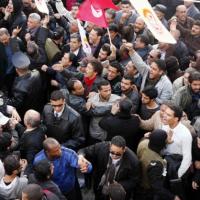
The revolution continues! Let’s prepare the next step in the fight back!
In recent days, Tunisia has experienced a historic moment, the announcement on 13 December, of the first general strike in the country since 1978 ("the famous Black Thursday"). This announcement had the effect of an electric shock. The word general strike was on everyone’s tongue, the masses and the political parties were talking about it relentlessly: finally the UGTT had decided to get down to serious business!
Despite the fact that the demands made by the UGTT had no social content and were purely defensive, well below the requirements of the situation (the union leadership limited demands to the dissolution of the ’Leagues of protection of the revolution’ – these militias at the service of the ruling party) the majority of the population, workers, youth, unemployed, had high hopes and expectations for this strike, and saw it as the beginning of a major counter-offensive against the government.
It was not until the eve of the strike, at the end of the day, that the Administrative Commission of the UGTT, consisting of 13 people, decreed the suspension of the strike until further notice. This announcement followed several hours of negotiations between the leadership of the trade union and the government. The agreement that emerged, however, does not look like a victory for the workers, but rather like a bitter retreat, which the situation can hardly justify. The union leaders, who entered the negotiations with almost nothing, came out of them with even less.
This proves once again a serious failure of democracy within the UGTT. Indeed, the union rank-and-file were overwhelmingly calling for a general strike for a long time, for social and economic demands, which did certainly not stop at the dissolution of the pro-Ennahdha militias. The general strike called by the UGTT was massively supported by large sections of trade unionists and young revolutionaries. In recent days, workers and young people came in waves to the headquarters of the UGTT at Mohamed Ali Square, to its regional offices, and to demonstrations across the country, to show their determination to make the 13th an historic day of mobilization against the government and for the continuation of the fight for the objectives of the revolution.
The leadership of the UGTT has a double discourse: sounding very radical when it addresses the working masses, as well as the activists of ’Popular Front’ who were protecting the HQ of the UGTT against the militias’ attacks. Here, members of the UGTT’s commission shouted loudly slogans such as, "the general strike is a duty, bringing down the system is a duty." On the other hand, they combined this with initiatives to create a consensus between the supposedly "modern" and "religious" wings of the ruling class – both blood-suckers of the workers and the poor.
This double game found its best illustration in the bureaucratic decision to cancel the strike, the impact and size of which would undoubtedly have been unprecedented. All at a time when the ruling power sends its militias against the trade unions and shoot at the children of the revolution with buckshot rifles.
The result of all this: a welcome respite for the government, and a blow to the morale of the mass of workers who have a real taste of bitterness and disgust after this bureaucratic decision. The leadership of the trade union has, in this case, lost much of its credibility.
This is yet one lesson more for all trade unionists and revolutionary activists internationally: be able to identify, within the labor movement, those who hinder the struggle of workers instead of driving it forwards, and put no hope in the trade union bureaucracy. This is why the CWI argues the need for the trade unions to have a campaigning and fighting leadership, accountable to its members, that fights uncompromisingly for the interests of the working class.
The best thing to do at present is to rely on the anger of the mass and workers to move forward in this second wind of revolution in Tunisia. The demand of the day must remain the building of a 24 hour general strike against the government. Indeed, as shown by the revolution itself, the effective mobilization of the strength of the organised working class across the country is the only language that the capitalist power, which Ennahda represents, can understand. The efforts put by this party to stop at all costs the strike to taking place, clearly hammer this reality home.
The struggle continues, the revolution as well!
-The revolution continues! For the popularization of the slogan of a 24 hour general strike, in the unions and on the streets!
-For general assemblies and the election of action committees across the country to prepare the next step together, and to ensure democratic control of the revolutionary struggle by the workers and the people themselves
-For fighting and democratic trade unionism! For a mass working class party, independent of the capitalists and of their representatives
-No to the rule of Ennahda! The unemployed, the workers and the masses are the ones who made the revolution, it is up to them to run the country!
-For a sustained struggle towards a revolutionary government of workers and youth, supported by the UGTT and other popular organizations


Be the first to comment